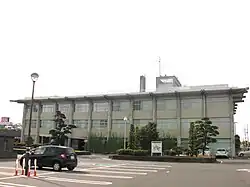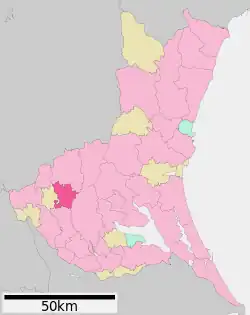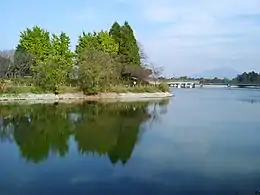Shimotsuma, Ibaraki
Shimotsuma (下妻市, Shimotsuma-shi) is a city located in Ibaraki Prefecture, Japan. As of 1 October 2020, the city had an estimated population of 41,638 in 16,021 households and a population density of 515 persons per km². The percentage of the population aged over 65 was 29.0%.[1] The total area of the city is 80.88 square kilometres (31.23 sq mi).
Shimotsuma
下妻市 | |
|---|---|
 Shimotsuma city hall | |
 Flag  Seal | |
 Location of Shimotsuma in Ibaraki Prefecture | |
 Shimotsuma | |
| Coordinates: 36°11′3.9″N 139°58′2.9″E | |
| Country | Japan |
| Region | Kantō |
| Prefecture | Ibaraki |
| Area | |
| • Total | 80.88 km2 (31.23 sq mi) |
| Population (October 2020) | |
| • Total | 41,638 |
| • Density | 510/km2 (1,300/sq mi) |
| Time zone | UTC+9 (Japan Standard Time) |
| Phone number | 0296-43-2111 |
| Address | 2-22 Honjo-cho, Shimotsuma-shi, Ibaraki-ken 304-8501 |
| Climate | Cfa |
| Website | Official website |
| Symbols | |
| Flower | Chrysanthemum |
| Tree | Pine |

Geography
Shimotsuma is located in western Ibaraki Prefecture. The Kinugawa River flows through the city.
Climate
Shimotsuma has a Humid continental climate (Köppen Cfa) characterized by warm summers and cool winters with light snowfall. The average annual temperature in Shimotsuma is 14.3 °C (57.7 °F). The average annual rainfall is 1,231.8 mm (48.50 in) with October as the wettest month. The temperatures are highest on average in August, at around 25.8 °C (78.4 °F), and lowest in January, at around 3.0 °C (37.4 °F).[2]
| Climate data for Shimotsuma (1991−2020 normals, extremes 1978−present) | |||||||||||||
|---|---|---|---|---|---|---|---|---|---|---|---|---|---|
| Month | Jan | Feb | Mar | Apr | May | Jun | Jul | Aug | Sep | Oct | Nov | Dec | Year |
| Record high °C (°F) | 17.7 (63.9) |
23.8 (74.8) |
26.1 (79.0) |
29.6 (85.3) |
33.3 (91.9) |
34.5 (94.1) |
37.0 (98.6) |
37.7 (99.9) |
36.8 (98.2) |
32.5 (90.5) |
25.5 (77.9) |
24.7 (76.5) |
37.7 (99.9) |
| Average high °C (°F) | 9.0 (48.2) |
9.9 (49.8) |
13.4 (56.1) |
18.8 (65.8) |
22.9 (73.2) |
25.5 (77.9) |
29.2 (84.6) |
30.7 (87.3) |
27.3 (81.1) |
21.7 (71.1) |
16.2 (61.2) |
11.2 (52.2) |
19.6 (67.4) |
| Daily mean °C (°F) | 3.0 (37.4) |
4.1 (39.4) |
7.6 (45.7) |
12.9 (55.2) |
17.8 (64.0) |
21.1 (70.0) |
24.7 (76.5) |
25.8 (78.4) |
22.4 (72.3) |
16.7 (62.1) |
10.5 (50.9) |
5.2 (41.4) |
14.3 (57.8) |
| Average low °C (°F) | −2.4 (27.7) |
−1.4 (29.5) |
2.0 (35.6) |
7.3 (45.1) |
13.4 (56.1) |
17.5 (63.5) |
21.3 (70.3) |
22.3 (72.1) |
18.7 (65.7) |
12.4 (54.3) |
5.4 (41.7) |
−0.1 (31.8) |
9.7 (49.4) |
| Record low °C (°F) | −13.7 (7.3) |
−11.4 (11.5) |
−6.4 (20.5) |
−3.2 (26.2) |
2.7 (36.9) |
9.9 (49.8) |
13.1 (55.6) |
14.9 (58.8) |
6.8 (44.2) |
1.1 (34.0) |
−3.8 (25.2) |
−7.7 (18.1) |
−13.7 (7.3) |
| Average precipitation mm (inches) | 39.1 (1.54) |
39.5 (1.56) |
80.2 (3.16) |
101.2 (3.98) |
122.9 (4.84) |
121.2 (4.77) |
144.2 (5.68) |
123.9 (4.88) |
171.9 (6.77) |
176.0 (6.93) |
70.5 (2.78) |
41.2 (1.62) |
1,231.8 (48.50) |
| Average precipitation days (≥ 1.0 mm) | 4.0 | 5.0 | 9.0 | 9.9 | 10.7 | 11.7 | 11.9 | 8.4 | 10.9 | 10.3 | 6.6 | 5.1 | 103.5 |
| Mean monthly sunshine hours | 199.4 | 184.7 | 186.2 | 181.3 | 177.8 | 123.0 | 141.8 | 175.0 | 133.2 | 137.2 | 154.2 | 179.3 | 1,978 |
| Source: Japan Meteorological Agency[3][2] | |||||||||||||
Demographics
Per Japanese census data,[4] the population of Shimotsuma peaked around the year 2000 and has declined slightly since.
| Year | Pop. | ±% |
|---|---|---|
| 1920 | 38,559 | — |
| 1930 | 37,829 | −1.9% |
| 1940 | 37,718 | −0.3% |
| 1950 | 42,123 | +11.7% |
| 1960 | 38,458 | −8.7% |
| 1970 | 35,512 | −7.7% |
| 1980 | 39,337 | +10.8% |
| 1990 | 42,704 | +8.6% |
| 2000 | 46,544 | +9.0% |
| 2010 | 44,987 | −3.3% |
| 2020 | 42,521 | −5.5% |
History
Shimotsuma developed as a castle town from the Muromachi period. It was the center of Shimotsuma Domain under the Tokugawa shogunate during the Edo period. The town of Shimotsuma was established on April 1, 1889 with the establishment of the modern municipalities system. It was elevated to city status on January 1, 1955.
On January 1, 2006, the village of Chiyokawa (from Yūki District) was merged into Shimotsuma.
Government
Shimotsuma has a mayor-council form of government with a directly elected mayor and a unicameral city council of 20 members. Shimotsuma contributes one member to the Ibaraki Prefectural Assembly. In terms of national politics, the city is part of Ibaraki 1st district of the lower house of the Diet of Japan.
Economy
The economy of Shimotsuma is primarily agricultural.
Education
Shimotsuma has nine public elementary schools and three public middle schools operated by the city government, and two public high schools operated by the Ibaraki Prefectural Board of Education. The prefecture also operates a special education school for the handicapped.
A Brazilian school Escola Pingo de Gente was formerly located in Shimotsuma.[5] It has since been renamed to Instituto Educare and moved to Tsukuba.[6]
Transportation
Highway
Local attractions
- Tsukuba Circuit
- Site of Shimotsuma Castle
- Lake Sanuma
Noted people from Shimotsuma
- Maki Tsukada, Olympic judoka
- Yasuhiro Awano, Olympic judoka
In popular culture
The city is the setting of Takemoto Novala's novel Shimotsuma Monogatari (also known as Kamikaze Girls), and the manga and film of that name. The movie was filmed on location in Shimotsuma.
References
- "Ibaraki prefectural official statistics" (in Japanese). Japan.
- 気象庁 / 平年値(年・月ごとの値). JMA. Retrieved March 30, 2022.
- 観測史上1~10位の値(年間を通じての値). JMA. Retrieved March 30, 2022.
- Shimotsuma population statistics
- "Escolas Brasileiras Homologadas no Japão" (Archive). Embassy of Brazil in Tokyo. Retrieved on October 13, 2015.
- "Escolas Brasileiras Homologadas no Japão" (Archive). Embassy of Brazil in Tokyo. February 7, 2008. Retrieved on October 13, 2015.
- "Joso Line". Kanto Railway-Stations. Retrieved 2007-06-20.
External links
![]() Media related to Shimotsuma, Ibaraki at Wikimedia Commons
Media related to Shimotsuma, Ibaraki at Wikimedia Commons
- Official Website (in Japanese)